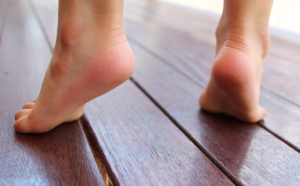At The Podiatry Practice in Brisbane, we often have parents bring their kids in concerned about them walking on their toes. Maybe their sister said it was ‘abnormal’ at a family gathering, or they’ve been watching for some time and noticed it’s not going away. The number 1 question – is this normal?
Until the age of 2, toe walking is generally not a concern. Most toddlers start walking between 12-15 months and will experiment with different positions and gait patterns as they ‘find their feet’. Roughly by age 2, however, children should walk with their heels on the ground and should start to show a heel-to-toe pattern from 3 years onwards. So what does it mean if your child continues walking beyond this time?
There are multiple causes for toe-walking, and the majority of the time these are benign. Such examples include –
- Habitual or copy-cat toe walking – Also called idiopathic toe-walking, some children get used to walking this way when young or copy one of their older siblings doing so
- Other health disorders – there is a growing body of evidence that children with conditions such as Asperger’s and other autism spectrum disorders have heightened sensitivity to neurological stimulus, and a more likely to be toe-walkers
- Ankle equinus – Shortening or tightness of the calf muscle making it difficult for the child to put their heels on the ground
- Genetics – Some studies suggest that a familial trait of certain muscle fibres can lead to tightness of muscles, including the calf.
The majority of the time children with benign toe-walking will stop doing so on their own by the age of 5. Experts suggest that as long as your child is growing and developing normally, toe walking on its own is unlikely to be a cause for concern.
Sometimes, however, toe walking persists and can be a symptom of underlying neurological, muscular and psychological disorders. These include –
- Cerebral palsy
- Muscular dystrophy
- Autism and spectrum disorders
- Achilles tendon contracture
In particular, it’s important to have your child checked if she toe walks AND –
- Has stiff muscles
- Is clumsy or uncoordinated
- Seems to be lagging in normal developmental milestones, particularly fine motor skills ( e.g. she can’t tie her laces or button her shirt)
- Seems unable to put the heels down at any time, even when standing still
- Has any other medical problems
- Was born prematurely
- Has previously walked flat-footed and only recently began to toe walk
How is toe walking treated? The majority of the time, benign or idiopathic toe walking can be managed conservatively with stretching, correct footwear and inserts used in the shoes to discourage the child from walking on their toes. Toe walkers with an underlying condition often require the input of a paediatrician.
So what should I do? We recommend any parent who is concerned has their child checked for peace of mind and early intervention if required. While the majority of cases resolve on their own, on-going and persistent toe-walking can cause a contracture of the Achilles which may require surgical intervention.
Have your child’s toe-walking assessed by one of our experienced podiatrists by booking online at by calling us on (07) 3391






